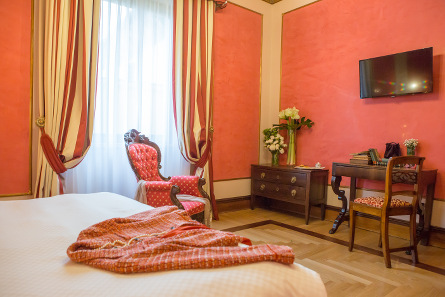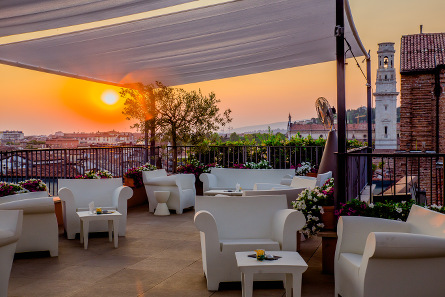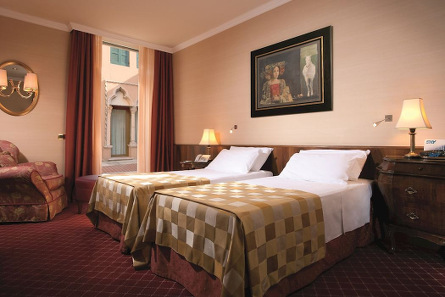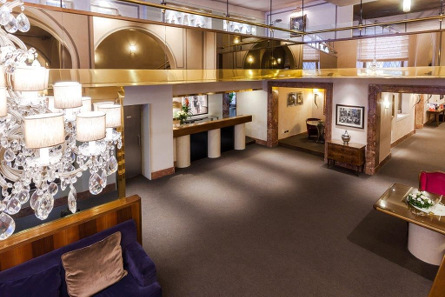Tosca♪, G. Puccini, the 16.
Anna Netrebko♪, Yusif Eyvazov, Luca Salsi
Carmen♪, G. Bizet, the 17.
Aida♪, G. Verdi, the 18.





from Thursday 15 to Monday 19 August 2024,
4 nights
Arrangement 11
Arrangement 11
Tosca
G. Puccini
G. Puccini
"Tosca" was first performed on January 14, 1900 at the Teatro Costanzi, now the Teatro dell’Opera di Roma, symbolically on the spot. The evening was a major social event, and in addition to the Prime Minister and the Queen, the composers Pietro Mascagni and Francesco Cilea were also present. With his "Tosca" Giacomo Puccini (1858-1924) entered a new century and, with his highly theatrical and effective scenes, he committed himself to Verist opera on the one hand and to the tragic-heroic grand opera on the other.
After seeing the drama of the same name by Victorien Sardous, which was a huge international success with Sarah Bernhardt in the leading role, the composer successfully applied to Sardou for the rights to create a libretto. The wealth of musical ideas (more than 60 themes appear as leitmotifs) and the breathless sequence of events are largely responsible for the immense tension and drama of the opera. By focusing on the main character, the work is considered a "prima donna opera" par excellence. Although it has always been suspected that a historical figure is behind Tosca, the characters and plot are freely invented.
However, the background against which the plot unfolds is historically determined by the Second Coalition War and the Battle of Marengo in 1800 between French and Austrian troops. Napoleon’s supposed defeat and his final victory over the coalition troops are reported in the first and second act of the opera.
Today "Tosca" is one of the most popular and most performed operas of all.
After seeing the drama of the same name by Victorien Sardous, which was a huge international success with Sarah Bernhardt in the leading role, the composer successfully applied to Sardou for the rights to create a libretto. The wealth of musical ideas (more than 60 themes appear as leitmotifs) and the breathless sequence of events are largely responsible for the immense tension and drama of the opera. By focusing on the main character, the work is considered a "prima donna opera" par excellence. Although it has always been suspected that a historical figure is behind Tosca, the characters and plot are freely invented.
However, the background against which the plot unfolds is historically determined by the Second Coalition War and the Battle of Marengo in 1800 between French and Austrian troops. Napoleon’s supposed defeat and his final victory over the coalition troops are reported in the first and second act of the opera.
Today "Tosca" is one of the most popular and most performed operas of all.
Daniel Oren - Hugo de Ana
Anna Netrebko
Anna Netrebko, born in 1971 in Krasnodar, Russia, studied singing at the St. Petersburg Conservatory and with Renata Scotto. She is considered to be the best and most famous soprano of our time - at the beginning of her career also as a pop star of the classical music scene, although she dedicates herself exclusively to classical music. Her performances are all a (media) event and always completely sold out. Anna Netrebko is a regular guest at the Metropolitan Opera in New York, the San Francisco Opera, the Lyric Opera of Chicago, the Royal Opera House Covent Garden in London, the Teatro alla Scala in Milan, the Opéra national de Paris, the Vienna and Berlin State Operas and at the Zurich Opera House and the Salzburg Festival. There she celebrated her final international breakthrough in 2002 as Donna Anna in Don Giovanni under the direction of Nikolaus Harnoncourt.
Her repertoire includes roles such as Violetta Valéry (La traviata), Maddalena di Coigny (Andrea Chénier), Lady Macbeth (Macbeth), Leonora (Il trovatore), Tatjana (Eugen Onegin), Elsa (Lohengrin) as well as the title roles in Tosca, Aida, Lucia di Lammermoor, Adriana Lecouvreur and Manon Lescaut. Numerous DVDs and CDs prove her enormous popularity and charisma as a gifted singer. Her song recitals and performances are experienced by critics and audiences alike as great moments and are greeted with frenetic applause.
In 2006 she was also granted Austrian citizenship. Anna Netrebko has a son from the partnership with the bass baritone Erwin Schrott and is currently married to the tenor Yusif Eyvazov.
Her repertoire includes roles such as Violetta Valéry (La traviata), Maddalena di Coigny (Andrea Chénier), Lady Macbeth (Macbeth), Leonora (Il trovatore), Tatjana (Eugen Onegin), Elsa (Lohengrin) as well as the title roles in Tosca, Aida, Lucia di Lammermoor, Adriana Lecouvreur and Manon Lescaut. Numerous DVDs and CDs prove her enormous popularity and charisma as a gifted singer. Her song recitals and performances are experienced by critics and audiences alike as great moments and are greeted with frenetic applause.
In 2006 she was also granted Austrian citizenship. Anna Netrebko has a son from the partnership with the bass baritone Erwin Schrott and is currently married to the tenor Yusif Eyvazov.
Arena
Carmen
G. Bizet
G. Bizet
Carmen is undoubtedly one of the most popular and most performed operas in the world. Its premiere in 1875 at the Opéra-Comique in Paris, however, was only a moderate success: The outrageous new realism, the brutality and vehemence in the actors’ actions, and not least the shady milieu, overwhelmed the conventional Parisian audience, which was stuck in old patterns of thought.
The opera is set around 1820 in Seville, Andalusia, and is based on the novella of the same name by Prosper Merimée. The libretto was co-produced by Henri Meilhac and Ludovic Halévy (nephew of composer Jacques Fromental Halévy and also cousin of Georges Bizet’s wife). Shortly after its premiere, Carmen began its triumphal march across the world via Vienna and the rest of Europe, a triumph that continues to this day.
The theme and plot of this opera inspired numerous artists to create independent works, and various (opera and dance) films as well as ballets were made. Georges Bizet (1838-1875), however, unfortunately did not live to see the triumph of his sensual and passionate masterpiece. Exactly three months to the day after the first performance, he succumbed to a fatal heart attack at the age of only 36.
The opera is set around 1820 in Seville, Andalusia, and is based on the novella of the same name by Prosper Merimée. The libretto was co-produced by Henri Meilhac and Ludovic Halévy (nephew of composer Jacques Fromental Halévy and also cousin of Georges Bizet’s wife). Shortly after its premiere, Carmen began its triumphal march across the world via Vienna and the rest of Europe, a triumph that continues to this day.
The theme and plot of this opera inspired numerous artists to create independent works, and various (opera and dance) films as well as ballets were made. Georges Bizet (1838-1875), however, unfortunately did not live to see the triumph of his sensual and passionate masterpiece. Exactly three months to the day after the first performance, he succumbed to a fatal heart attack at the age of only 36.
Leonardo Sini - Franco Zeffirelli
Clémentine Margaine, Mariangela Sicilia, Francesco Meli, Dalibor Jenis
Arena
Aida
G. Verdi
G. Verdi
Giuseppe Verdi (1813-1901) wrote his “Aida” at a politically highly explosive time: Germany and France were on the brink of war (Franco-Prussian War 1870/71), which is why the premiere could not take place until a year later after the scheduled date: Because both the stage sets and the costumes were stuck in the Prussian occupied Paris. The opera had been commissioned by the Egyptian Viceroy Ismail Pasha. However, not, as often wrongly assumed, for the inauguration of the Suez Canal, but for the opening of the new opera house in Cairo in 1871.
Aida shows the versatility of this exceptional Italian composer in its entirety: large-scale mass scenes and choruses are juxtaposed with equally intimate, chamber-play-like scenes that reveal a soul drama that is ingenious in every detail. In this respect, the work can certainly be interpreted as a turning point in Verdi’s oeuvre, as it not only focuses on the vocal parts, but also assigns a new and leading role to the orchestra.
Verdi received the 150,000 gold francs demanded for his composition, probably the highest honorarium granted to a composer to date. In addition, he demanded his own trumpets for the famous Triumphal March, the so-called Aida trumpets, which had to be commissioned as a special production. Today "Aida" is one of the most successful of the great operas of the 19th century.
Aida shows the versatility of this exceptional Italian composer in its entirety: large-scale mass scenes and choruses are juxtaposed with equally intimate, chamber-play-like scenes that reveal a soul drama that is ingenious in every detail. In this respect, the work can certainly be interpreted as a turning point in Verdi’s oeuvre, as it not only focuses on the vocal parts, but also assigns a new and leading role to the orchestra.
Verdi received the 150,000 gold francs demanded for his composition, probably the highest honorarium granted to a composer to date. In addition, he demanded his own trumpets for the famous Triumphal March, the so-called Aida trumpets, which had to be commissioned as a special production. Today "Aida" is one of the most successful of the great operas of the 19th century.
Daniel Oren - Gianfranco de Bosio
María José Siri,
Ekaterina Semenchuk♪, Youngjun Park, Ivan Magri, Simon Lim
Ekaterina Semenchuk
Ekaterina Semenchuk was born in the former Soviet Union in Minsk in 1976. She studied singing at the Rimsky-Korsakov Conservatory in St. Petersberg and made her debut at the famous Mariinsky Theater while still a student. Her broad repertoire includes important and technically demanding roles such as Azucena in Verdi’s Il trovatore, Princess Eboli (Don Carlo) and Amneris (Aida), as well as the roles of Santuzza (Cavalleria rusticana), Marina (Boris Godunov) and the title role of Carmen. The mezzo-soprano makes guest appearances at all the major international houses such as the Metropolitan Opera in New York, the Opéra de Paris, the Teatro Real in Madrid, the Royal Opera House Covent Garden in London, the Teatro alla Scala or at the Salzburg Festival.
Arena
Hotel informations for Verona 11


Due Torri *****
The Due Torri Hotel *****, housed in a medieval building from the 14th century, is the first choice for the demanding Verona traveler. It exudes the charm of its rich past and offers guests all the comfort and unobtrusive luxury. From the spacious roof terrace you can enjoy the aperitivo, the magnificent view over the city to the Alps. Located in the heart of the historic center, close to the River Adige and the Church of Sant’Anastasia, the hotel is within easy walking distance of all major attractions. The Arena di Verona is a short 15-minute walk away.


Accademia ****
The Accademia hotel **** offers tradition, comfort and a pleasant service. It is situated in the historical town centre, only 100 metres away from the Arenas, in a very quiet street, perpendicular to the famous Via Mazzini, symbol of the elegance and the luxury of Verona. This establishment of 94 rooms has a bar, a restaurant and a private garage.
All-inclusive price per person for Verona 11
Single room/ night
Due Torri
3.780,- Euro
170-210,- Euro
Accademia
from 3.120,- Euro
190-230,- Euro

The price includes
Overnights including breakfast, good opera tickets, scheduled flight, return taxi transfers, travel cancellation expenses insurance.





